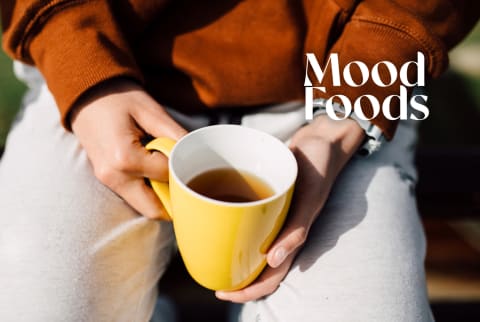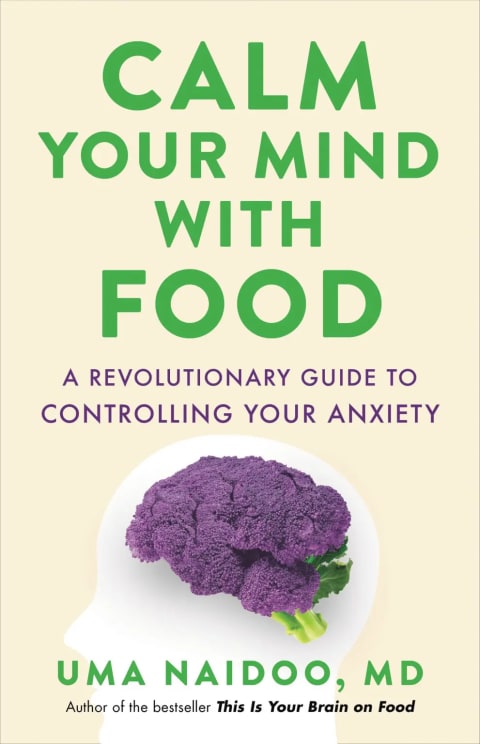Advertisement
I'm A Nutritional Psychiatrist: The Brain-Healthy Drink I Sip Every Single Day


Steep, stir, sip. Repeat. Tea and its preparation may seem mundane, but as a nutritional psychiatrist and tea lover myself, the beverage means so much to me.
If I could describe the essence of tea making, I'd borrow a page from my roots in Africa and use the word itutu—a Yoruba phrase that denotes a particular approach to life: unhurried, assured, cool, calm.
During my mornings, after I wake up, do my morning meditation, and sit down to sip my cup of my grandmother's golden chai turmeric, that is exactly how I feel—with itutu.
Drinking tea is a tradition that I shared with my beloved late grandmother since childhood. It helps me ground myself, set my intentions for the day, and start off with the right mindset.
How tea taps into two nutritional psychiatry principles: body intelligence and mindfulness
The right foods are certainly beneficial for the brain due to their array of rich micronutrient and macronutrient profiles. However, equally important is the mindset in which we approach food, eating, and nourishment.
Eating mindfully means using your physical and emotional senses to experience your food, giving gratitude for your meals, and reflecting on your food choices to understand your underlying food motivations. This can empower you to make positive changes in your diet.
The soothing art of preparing tea and slowly sipping it can promote mindfulness and help you tune in to your body's intelligence.
Adopting a ritual of preparing and sipping on a concoction that is simple and nourishing can encourage the cultivation of a calm, reflective outlook toward your eating choices and, more broadly, to life.
Beyond that, teas are also packed with brain-healthy nutrients
Teas provide many neuroprotective benefits through a diverse array of micronutrients, antioxidants, and, incidental but vitally important, hydration!
Different teas can boost the mind with a variety of unique nutrients. Sipping on these soothing beverages can also help promote relaxation and improve sleep quality, both of which are essential for managing mental health and—as I write about in my upcoming book, Calm Your Mind With Food—also help with anxiety.
Here are some of my favorite teas and their associated neuroprotective benefits:
- Green tea: Green tea is rich in a dopamine-boosting amino acid called L-theanine. L-theanine is a unique amino acid present almost exclusively in the tea plant, from which most varieties of tea are produced. It enhances alpha brain waves ("relaxation" waves), decreases excitatory chemicals in the brain, and boosts calming brain chemicals such as GABA. Overall, sipping green tea is a great way to help yourself relax (though it does contain caffeine!) and keep stress at bay. It also boasts many other health properties that are anti-cancer1, antiviral2, anti-obesity3, and antibacterial4. Matcha is powdered green tea that is easy to add to smoothies or other foods and drinks—there's no need to steep it as you would traditional tea leaves.
- Chamomile tea:Chamomile is an herb that comes from the daisy-like flowers of the Asteraceae plant family. It has been consumed for centuries as a natural remedy for several health conditions, and it has been shown in several studies 5to help lower anxiety and improve sleep quality6. If you are pregnant or trying to get pregnant, consult your doctor before trying chamomile.
- Lavender tea: Lavender essence has been shown in several studies 7to lower anxiety, improve sleep, and reduce feelings of stress by boosting dopamine production and reducing cortisol levels. Lavender also contains many anti-inflammatory compounds8. I love making a lavender tisane from dried lavender, hot water, and sometimes a sprig of fresh mint or a slice of lemon.
- Turmeric tea: Turmeric tea makes an amazing brain-boosting cup due to its active ingredient, curcumin, which has antioxidant, anti-inflammatory, and neurotrophic activities. Studies show that curcumin is associated with improvements in attention, overall cognition, and memory. When you prepare turmeric tea, always add some freshly ground pepper to the mix! Golden Milk made with turmeric is also a delicious and soothing treat.
- Lemon balm tea: Tea made with lemon balm, a member of the mint family, also promotes relaxation and a reduction in stress and anxiety by interacting with several neurotransmitters in the brain9, including GABA, serotonin, and acetylcholine. The anti-inflammatory and antioxidant properties10 of lemon balm are an additional benefit that can protect neurons against oxidative stress and reduce chronic inflammation.
The takeaway
We all need ways to come back to center. Try preparing these teas so that you can find the itutu in your day. Learn more about the health benefits of tea and how to work them into your routine here.
10 Sources
- https://www.ncbi.nlm.nih.gov/pmc/articles/PMC9658101/
- https://pubmed.ncbi.nlm.nih.gov/32741697/
- https://pubmed.ncbi.nlm.nih.gov/23235664/
- https://pubmed.ncbi.nlm.nih.gov/31372566/
- https://pubmed.ncbi.nlm.nih.gov/27912875/
- https://pubmed.ncbi.nlm.nih.gov/31006899/
- https://pubmed.ncbi.nlm.nih.gov/31655395/
- https://pubmed.ncbi.nlm.nih.gov/26247152/
- https://www.ncbi.nlm.nih.gov/pmc/articles/PMC4245564/
- https://pubmed.ncbi.nlm.nih.gov/34449930/

Why Nutrition Is Key To Changing Your Relationship With Alcohol
Brooke Scheller, DCN, CNS

Why Alcohol Sabotages Your Gut Health & How To Get Back On Track
Brooke Scheller, DCN, CNS

Why Nutrition Is Key To Changing Your Relationship With Alcohol
Brooke Scheller, DCN, CNS

Why Alcohol Sabotages Your Gut Health & How To Get Back On Track
Brooke Scheller, DCN, CNS

Why Nutrition Is Key To Changing Your Relationship With Alcohol
Brooke Scheller, DCN, CNS

Why Alcohol Sabotages Your Gut Health & How To Get Back On Track
Brooke Scheller, DCN, CNS

Why Nutrition Is Key To Changing Your Relationship With Alcohol
Brooke Scheller, DCN, CNS

Why Alcohol Sabotages Your Gut Health & How To Get Back On Track
Brooke Scheller, DCN, CNS















